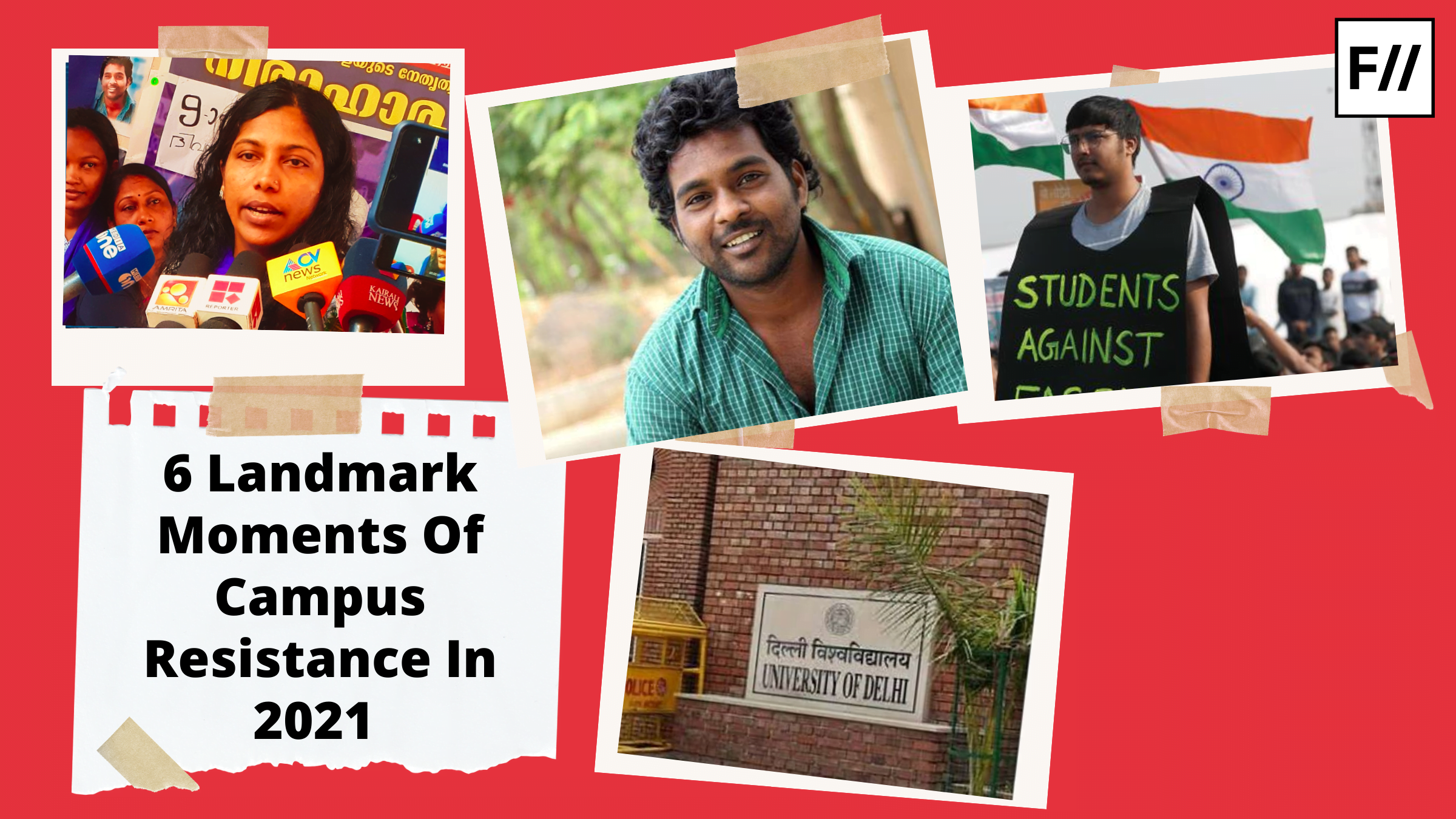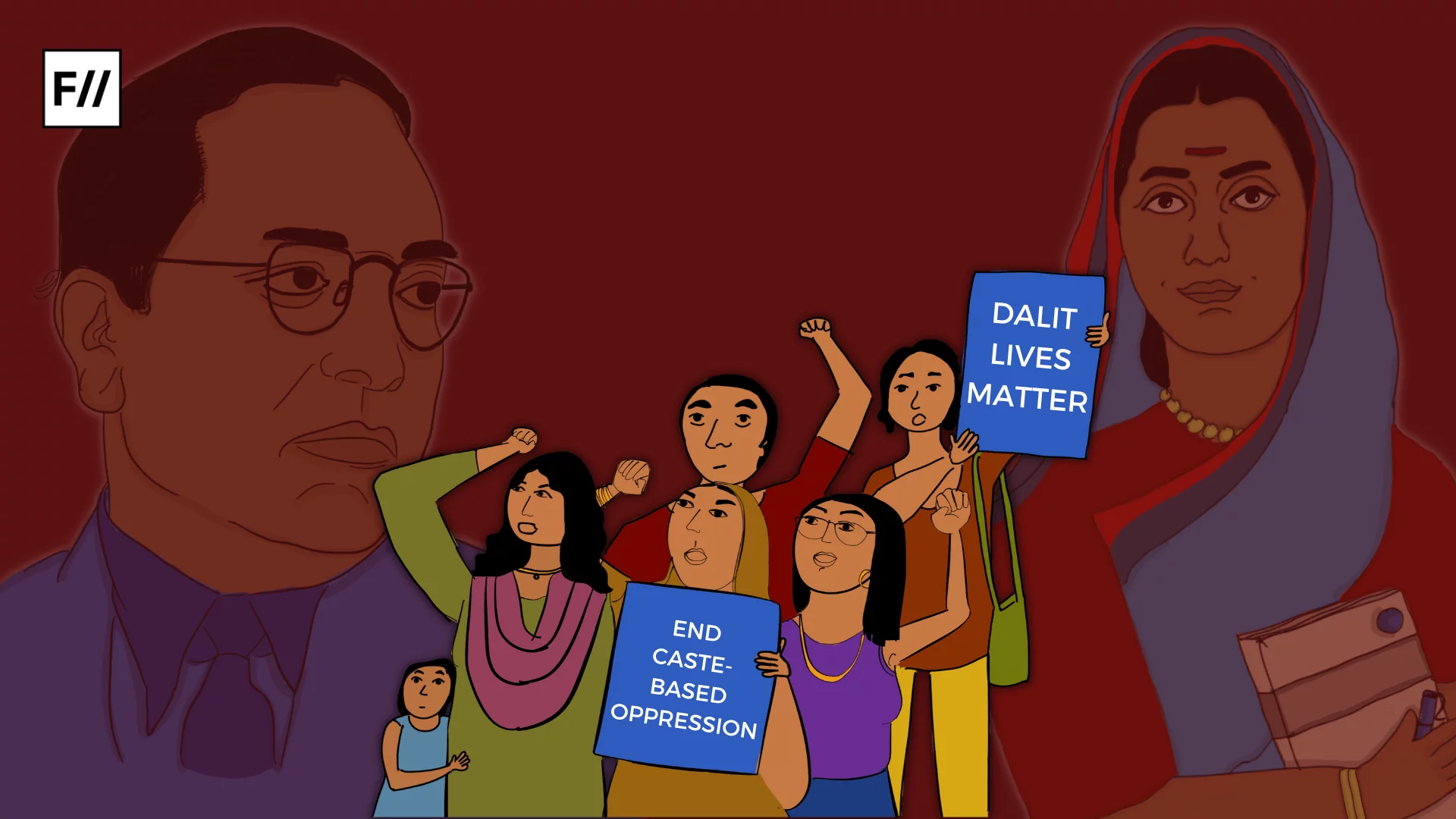Campuses have been a neglected space in terms of protest history in India. It is only with the active disruption that students brought with them during the Rohith Vemula and anti-CAA movements that campus activism became part of popular conversation. Over the past two years, activism in college spaces had to take a compulsory turn towards digital spaces because of COVID-19. Mass shut down of educational spaces owing to the pandemic created a new wave of online/offline forms of dissent. However, the persistence of students about their rights and about their space is consistent. Here is a list of some of those seminal moments of 2021 from campuses across the country, calling your attention to the voices of those students who had been dismissed as “activist types”.
1. The landmark victory of Deepa P Mohanan against campuses that pretend to be casteless
Deepa P Mohanan, a Ph.D. scholar from Mahatma Gandhi University, Kerala, ended her hunger strike on a note of victory for Dalit and Bahujan students nationwide against institutional casteism and intimidation. Deepa, a scientist, and scholar in the field of nanoscience had faced a decade of discrimination at the hands of Prof. Nandakumar Kalarickal, Director of International and Inter-University Centre for Nanoscience and Nanotechnology (IIUCNN).
Also read: Anupama & Deepa P Mohanan’s Cases: The Intersectionality Crisis In Kerala’s Left Politics

Deepa is the only Dalit scholar in her batch and has been targeted by Nandakumar for the same, by deliberately blocking her access to the lab, her stipend and even reportedly locking her alone in the lab once. It was the university’s refusal to remove Nandakumar that led Deepa to call an indefinite hunger strike demanding three things – removal of Nandakumar, a change of her Ph.D. supervisor, and access to the lab and materials to complete her thesis.
Although MG university has granted these demands, Deepa’s victory is only momentary in the history of Ambedkarite resistance and self-respect movements across university campuses in the country that did not end with death. Deepa P Mohanan’s fight is a substantial step in winning justice for Rohith Vemula, Payal Tadvi, Fathima Latheef, and names that mainstream media did not pick up.
Although MG university has granted these demands, Deepa’s victory is only momentary in the history of Ambedkarite resistance and self-respect movements across university campuses in the country that did not end with death. Deepa P Mohanan’s fight is a substantial step in winning justice for Rohith Vemula, Payal Tadvi, Fathima Latheef, and names that mainstream media did not pick up.
2. Professor Appa Rao Podile should have been suspended a long time ago. This year, he finally leaves office.
University of Hyderabad announced that former Vice-Chancellor Appa Rao Podile will step down from office. It was during the tenure of Podile that Dalit research scholar Rohith Vemula died by suicide due to the toxic, casteist bias that Podile and his administration continue to hold. The news has brought relief and some amount of closure to students of the university, especially to the Ambedkar Students Association of which, Rohith was a member. ASA – HCU along with several other organisations had refused to acknowledge the authority of Appa Rao as Vice-Chancellor, to an extent that they never stepped inside the Vice Chancellor’s chamber. After five long years of struggle, ASA finally steps foot inside the office chamber of the VC with a framed picture of Ambedkar marking a symbolic win for campuses around the country and as a reminder that atrocities committed are never forgotten or forgiven.

3. #Reopen campus. End online education
The initial stages of COVID-19 caused a lot of panic among campus communities due to the nationwide lockdown, causing several students to lose access to classrooms, labs, libraries, hostels, and their safe haven from domestic and family abuse. Students were asked to leave university/college premises to avoid an outbreak of COVID on campus, bringing into question how quick campus authorities are about washing their hands off of any liability about their students’ health. 2020 went by with an unusual form of synchronous and asynchronous form of online education. Ironically, this method of teaching has been one of the prime demands of students with disabilities for decades and no one bat an eye about it until the pandemic switched off all other options.
Throughout 2020, students put up with the new normal until universities started becoming too comfortable with online education and having a system where students are not required to be physically present. Protests broke out when colleges began rolling out higher tuition fees, urging students to pay for amenities like yoga centers, labs, and libraries that they couldn’t even use. The students of DU took to Twitter racking up a storm called #reopendu. The students of TISS ran a week-long signature campaign urging their administration to call back students. Similar protests were seen in JNU, HCU, and Jamia causing a large phase-wise return of students in 2021 with “proper” covid measures.
4. Calling out the caste-based oppression in premier educational institutions of India
Online teaching had also brought to light the harassment that professors and teachers so casually hurl at their students, only this time, they were recorded and tried on social media. In May 2021, IIT Kharagpur had suspended Professor Seema Singh from the Department of Humanities and Social Science when a recorded video of her online lecture went viral. In the video, we can see the professor yelling, “You bloody bastards. Do you have any shame? Are you in school? bloody bastards?” while the students looked on in silence.
5. Crowdfunding fees for first-generation students from marginalised communities is the biggest win of campus movements this year
Education abroad is a scary thing for students who do not have the security of generational wealth, and especially for first-generation learners from marginalised communities who have to learn the ropes of a college education by experiencing it first-hand.
In June this year, #SumitToOxford was making the rounds on Twitter, crowdfunding fees for Sumit Samos, rapper, scholar, and anti-caste activist who was admitted to Oxford University to study MA in Modern South Asian Studies. In the past, there were scholarships that helped students from India and other institutions that provided fully-funded scholarships for students to study in a western university, but these scholarships do not attempt to sensitize themselves on caste. Similarly, Indian banks do not provide student loans unless those seeking financial support provide collateral. When these discriminatory walls cut off access to higher education for students from marginalised communities, it was subversive to turn to crowdfunding platforms. This year, campus students, teachers, and communities were able to crowdsource the fees for many students from marginalised communities. In an exclusionary system of education, these moments of praxis are vital to help break the myth of meritocracy in India.
Also read: Caste-Based Discrimination Rampant In Higher Educational Institutions, Affirms Study

6. Student-run campus kitchens are exemplars of why our colleges do not care.
When the second wave of COVID-19 was at its peak, students who had stayed behind or returned to campus had started testing positive for COVID. It became a crisis for university administrations to provide necessary isolation facilities for their students so as to avoid a mass outbreak.
Unfortunately, due to the lack of non-teaching staff and slowpoke admins, feeding sick students fell into the hands of student representatives. In 2021, we saw a group of student unions, as well as teacher unions, participate in cooking for COVID-positive students stuck on campus so that everyone gets three meals a day. At Hyderabad Central University, the Student and Teacher’s Union took turns cooking for those quarantined at their on-campus guest house. Similar individual efforts were taken up by teachers across the country.
In Patna, Aprajita Krishna, head of the physics department at Patna Women’s College prepared meals for over 100 people in her locality. Student activists of PDSU from Osmania University had begun a voluntary initiative called George Reddy Helping Hands that brought food at the doorsteps of COVID-19 patients. In unprecedented times like this, it puts forth the question, “What does our educational system have up its sleeve to safeguard our student’s health?”. The answer is none.
In Patna, Aprajita Krishna, head of the physics department at Patna Women’s College prepared meals for over 100 people in her locality. Student activists of PDSU from Osmania University had begun a voluntary initiative called George Reddy Helping Hands that brought food at the doorsteps of COVID-19 patients. In unprecedented times like this, it puts forth the question, “What does our educational system have up its sleeve to safeguard our student’s health?”. The answer is none. The lockdown took away three-day meal schemes in many government schools, thereby cutting off the only nutritious food that many kids rely on. What do our students eat, did anyone care to ask?
Sharon(she/her) is a literature graduate from the University of Hyderabad currently working on her research proposal even though a nice long gap from academics will do her good. But, she never listens to her own advice and spends most of her time being anxious. Her life is full of queerplatonic relationships and she can’t seem to stop writing about love and loss. In her free time, she reads photographs and writes long emails. You can find her on Instagram and WordPress.
Disclaimer: This is by no means an exhaustive or representative list. Suggestions to add to the list are welcome in the comments section.
About the author(s)
Sharon is a staff writer for FII.




